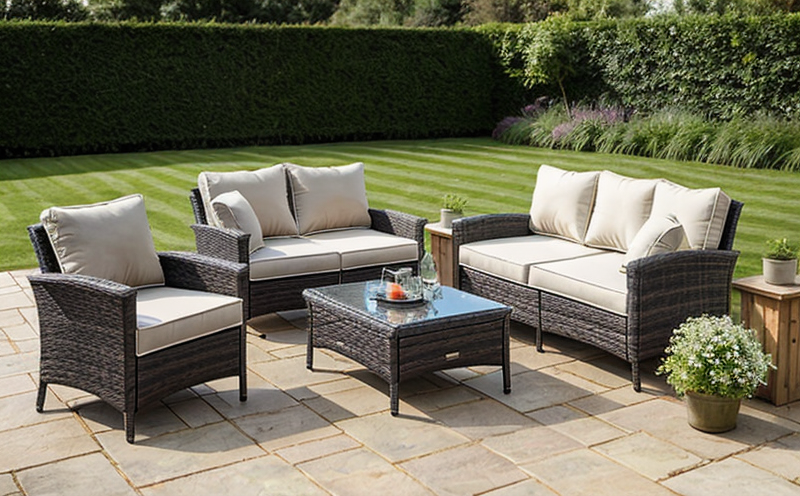UNE EN 581-2 Outdoor Seating Mechanical and Durability Testing
The UNE EN 581-2 standard provides a comprehensive framework for assessing the mechanical strength and durability of outdoor seating products, ensuring they can withstand the harsh environmental conditions often encountered in public spaces. This test is critical for manufacturers aiming to deliver high-quality furniture that maintains its integrity over extended periods.
The testing process involves subjecting specimens to various mechanical stressors designed to replicate real-world usage scenarios. These scenarios include repeated loading cycles, impact tests, and exposure to environmental factors such as temperature fluctuations, humidity, and UV radiation. The purpose is to evaluate the furniture's ability to endure these conditions without compromising its structural integrity or aesthetic appeal.
UNE EN 581-2 covers a wide range of outdoor seating types, including chairs, benches, tables, and other similar fixtures. It specifies detailed procedures for specimen preparation, testing methods, and acceptance criteria that must be met to ensure compliance. Compliance with this standard is essential for manufacturers looking to meet regulatory requirements and gain consumer trust.
The test parameters are meticulously designed to simulate the stresses furniture faces in outdoor settings. This includes static load tests, fatigue strength assessments, impact resistance evaluations, and environmental stress cracking tests. These tests help identify potential weak points that could lead to premature failure or damage under operational conditions. By conducting these tests, manufacturers can ensure their products meet or exceed industry standards.
Specimen preparation plays a crucial role in achieving accurate test results. This involves selecting appropriate materials and dimensions for the specimens based on the product being tested. The preparation process ensures that the specimens accurately represent the end-use product, allowing for reliable testing outcomes. After preparing the specimens, they are subjected to various mechanical tests using specialized equipment designed to replicate real-world conditions.
The testing apparatus used in UNE EN 581-2 includes a variety of machines and devices tailored to specific test requirements. These may include hydraulic presses for load application, impact testers for assessing resistance to falls or impacts, environmental chambers to simulate temperature and humidity variations, and UV curing lamps to evaluate long-term exposure effects. The use of such precise equipment ensures accurate and repeatable results.
Acceptance criteria play a vital role in determining whether the tested specimens meet the required standards. These criteria are based on predefined limits for various parameters such as load capacity, impact resistance, and dimensional stability. Compliance with these criteria indicates that the furniture has passed all necessary mechanical and durability tests successfully. Meeting these acceptance criteria not only ensures product quality but also enhances consumer confidence in the brand.
In summary, UNE EN 581-2 provides a robust framework for assessing the mechanical strength and durability of outdoor seating products. By following this standard’s detailed procedures, manufacturers can ensure their furniture meets stringent quality standards, thereby enhancing both product performance and customer satisfaction. This testing process helps identify potential weaknesses early on in the development cycle, allowing for necessary improvements before full-scale production.
Why It Matters
The UNE EN 581-2 standard is crucial because it ensures that outdoor seating products are robust enough to withstand the rigors of daily use and environmental challenges. Compliance with this standard not only protects manufacturers from potential legal issues but also enhances brand reputation by demonstrating a commitment to quality.
From a practical standpoint, adhering to UNE EN 581-2 helps prevent costly repairs or replacements due to premature failure caused by substandard materials or poor design. It also ensures that products meet safety regulations and guidelines set forth by relevant authorities, further safeguarding public health and wellbeing.
For quality managers and compliance officers within organizations involved in furniture manufacturing, ensuring adherence to UNE EN 581-2 is essential for maintaining a strong market presence. By demonstrating robust testing procedures, companies can build trust with consumers who value longevity and reliability from their purchases. This transparency fosters long-term loyalty among customers and contributes positively towards brand image.
R&D engineers benefit greatly from rigorous mechanical durability testing as it provides valuable insights into material properties under extreme conditions. This knowledge enables continuous improvement in product design, leading to innovations that enhance user experience while maintaining high standards of safety and performance.
Eurolab Advantages
EuroLab offers unparalleled expertise in conducting UNE EN 581-2 tests with precision and reliability. Our state-of-the-art facilities are equipped with advanced testing machines capable of simulating diverse environmental conditions, ensuring accurate replication of real-world scenarios during mechanical strength assessments.
Our team comprises highly qualified professionals who possess deep knowledge and experience in furniture testing methodologies. They stay updated with the latest industry trends and best practices, enabling them to provide comprehensive services that go beyond basic compliance checks. This commitment ensures our clients receive detailed reports tailored specifically for their needs.
We pride ourselves on delivering timely results without compromising accuracy or thoroughness. Our experienced staff works closely with customers throughout every stage of the testing process, offering guidance and support whenever needed. This personalized approach helps ensure smooth integration into existing workflows while maintaining the highest levels of quality assurance.
Competitive Advantage and Market Impact
Ensuring compliance with UNE EN 581-2 through EuroLab not only sets a company apart in terms of product quality but also contributes significantly to its competitive edge. By investing in robust testing, manufacturers demonstrate their commitment to delivering reliable products that stand the test of time.
This commitment translates directly into enhanced customer satisfaction and loyalty, fostering stronger relationships with end-users who appreciate well-crafted furniture that lasts longer than average alternatives. Furthermore, it opens up opportunities for expanding into new markets where regulatory compliance is paramount.
By meeting or exceeding the requirements outlined in UNE EN 581-2, companies position themselves favorably against competitors who may not adhere to similar standards. This competitive advantage can lead to increased market share and improved profitability as satisfied customers become repeat buyers and advocates for your brand.





